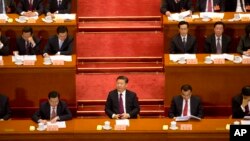Chinese President Xi Jinping has been described as China’s most powerful leader in many years.
Xi is firmly in control of the world’s most populous country. China watchers say that was clear during recent high-level meetings in Beijing.
Now, experts are wondering whether Xi could seek a third term as president.
In early March, thousands of delegates gathered in Beijing for China’s National People’s Congress and the Chinese People’s Political Consultative Conference.
Plans for future policies are announced during the meetings.
Delegates repeatedly referred to Xi Jinping as “core leader of the (Chinese Communist) party.” That was not done in the past for his predecessor, Hu Jintao.
However, the term core leader of the party was used years ago for former leaders Mao Zedong and Deng Xiaoping.
Willy Lam studies China’s leadership. He told VOA the description of Xi as a core leader means he will be in power a long time.
“So having been designated the core leader, that means he is virtually emperor for life, and that is the message Xi Jinping wants to tell the Chinese people and leaders of other countries, that he will be around to guide the realization of the Chinese Dream,” Lam said.
The “Chinese Dream” is a term used by Xi when he took power in 2012. The saying means the redevelopment of the nation.
As Xi nears the end of his first five-year term as president, some China watchers believe it is too early to consider his successor. Succession is a politically sensitive issue in the country. It also can take a long time.
Changes in China’s leadership have become more predictable since 2000. Under the constitution, the president can serve up to two terms.
A major political leadership meeting this year
Later this year, another major political meeting will take place in Beijing. The 19th Communist Party Congress will be held. The Congress will lead to changes in the party’s central leadership in October or November.
The Communist Party Secretary of Guizhou Province, Chen Min’er, has been suggested as a possible candidate for the presidency after Xi Jinping leaves office.
Jean-Pierre Cabestan is a political scientist at Hong Kong Baptist University. He said many people think that Xi will wait until close to the end of his second term, in 2022, before naming his successor.
“The theory is that he wants to wait another five years before designating a successor,” said Cabestan. He also said that as the party congress nears, talk of Xi as a core leader will intensify.
The 19th Party Congress will be a time of change for China’s top decision-making group, the Politburo Standing Committee. It is made up of between five and nine party members. Some wonder whether Xi will reduce the current number from seven to five.
As many as four committee members may be replaced, experts say. The Standing Committee is part of a larger group of 25 members known as the politburo. It is the executive committee of China’s Communist party. About half of those members will need to be replaced because of age limits. Experts say age requirements are also an issue for the powerful Central Military Commission.
Xi’s power has increased with new duties
Since he became head of China’s Communist Party in 2012, Xi Jinping has aggressively strengthened his power. He now holds nearly all the most powerful positions in the party and government.
Xi serves as General Secretary of the Chinese Communist Party. He is head of state as President of the People’s Republic of China. And he leads the military as Chairman of the Central Military Commission.
He also serves as the head of other important groups. These include the Central National Security Commission and the Leading Group for Financial and Economic Affairs.
Experts see this as a sign that he plans to be in office for many years. Willy Lam compares Xi to Russian President Vladimir Putin.
“It looks like he wants to leave a big legacy, and that’s why he is, in a sense, emulating President Vladimir Putin, by giving himself a virtual office for life,” he said.
However, as Cabestan notes, that would mean a change to current laws.
“Now, whether he is going to stay more than 10 years as president is another story because that would require an amendment of the constitution,” he said.
Lam told VOA that Xi sees himself as the Mao Zedong of the 21st century. Mao was Communist China’s first leader until his death in 1976
Cabestan points out that Xi may step down from the job of president while continuing to lead important groups such as the military or security commissions.
Will Xi serve three terms?
VOA spoke with some delegates at the two meetings earlier this month. Some wondered whether Xi will seek a third term. Most supported the idea, but several placed importance on the need to follow the rules.
“According to party regulations it is two terms,” said Luo Shaming who added that Xi is doing “a very good job.”
Zhao Yan Fen said age is not too important. “What is more important is whether a leader can really help promote a country’s development and the development of the world,” she said.
I’m Mario Ritter.
Bill Ide and Brian Kopezynski reported this story for VOA News. Mario Ritter adapted their reports for Learning English. George Grow was the editor.
Do you think China’s President Xi Jinping will seek a third term? Let us know in the comments section.
____________________________________________________________
Words in This Story
refer – v. to call
core – adj. the central part of something
predecessor –n. a person who served in a position before someone else
designated – adj. named, appointed to some position
virtually – adv. almost, very nearly
successor – n. the person who follows someone else in a position






